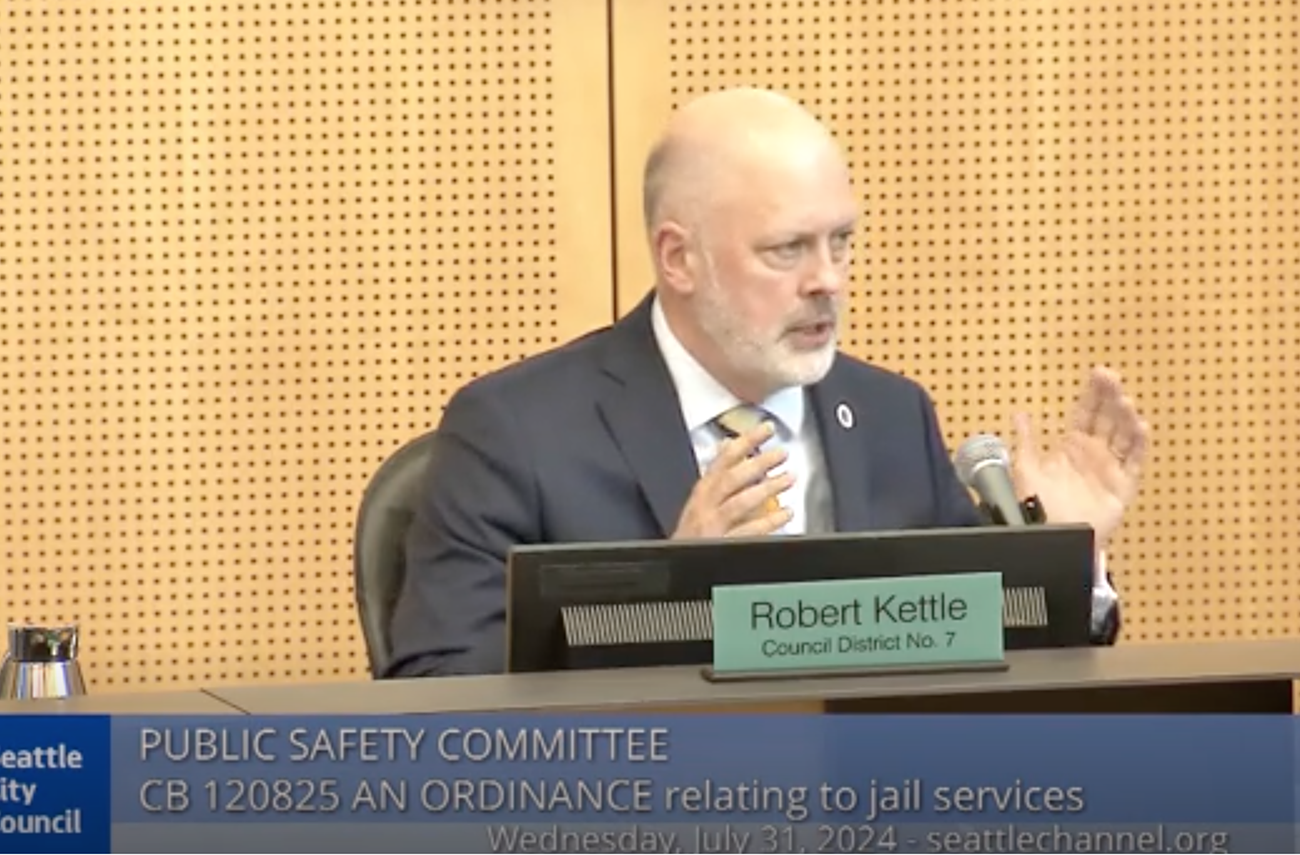Moving at lightning speed after doing nothing for months, on Wednesday the Seattle City Council’s Public Safety Committee voted to send the full council a bill approving a contract with the South Correctional Entity (SCORE) in Des Moines, despite lingering questions around cost and operations. The contract could potentially increase the City’s deficit, or drain funds from another City program, but the council refused to wait for more details on any of that as they desperately try to pass something that will allow them to say they attempted to take a bite out of crime.
Last week, Mayor Bruce Harrell sent the city council legislation regarding the SCORE contract, which outlined a plan to pay the jail $2 million per year for 20 beds. The City would use those beds to hold people accused of nonviolent, low-level misdemeanor crimes for 24 to 48 hours. Harrell acknowledged in his announcement that the jail would hold people for such a short time because the nature of their alleged crimes would likely not result in further prosecution following their first appearance in court.
Harrell wants the option to send people to SCORE because low staffing numbers forced the King County Jail to impose booking restrictions that limit the admission of nonviolent misdemeanors, except in cases where someone presents a public safety threat. Last week, the jail agreed to lift booking restrictions for downtown, including areas such as Little Saigon and Belltown, until the end of the summer, according to a council central staff memo.
Still, the mayor’s office and the council chafes at having to ask King County every time they want to throw a shoplifter in jail, hence Public Safety Committee Chair Bob Kettle's special committee hearing to vote on this SCORE legislation.
Kettle opened the discussion by voicing his support for the bill and by championing the council’s new tough-on-crime majority. While he and others on the committee touted the measure as a way to significantly improve public safety, the plan looks pretty silly and wasteful, and major operational questions remain unanswered. The whole idea amounts to paying cops to drive nonviolent offenders 15 miles away, drop them off at the jail, hold them for 24 to 48 hours, and then drive back down there, pick them up, and drive back up to Seattle to provide a “warm hand-off” to service providers or maybe a case manager with very little to offer; phone numbers for overfilled shelters, etc.
During the public comment period, there seemed to be some disconnect between what people want this bill to do and what this bill will actually do. Most of the people who spoke in favor of the legislation described their desire to address those accused of violent felonies, not people stealing less than $750 worth of groceries, which would be the type of person the City would send to SCORE under this contract.
King County Department of Public Defense Director Anita Khandelwal illustrated the likely ineffectiveness of the bill with a recent example of a case involving a person on the City’s High Utilizer Initiative (HUI) list. The jail booked the man twice in one week for stealing groceries, holding him for less than 24 hours both times. The time in jail altered nothing about the fact that the man remained hungry, Khandelwal argued. He ended up back in jail on a felony burglary charge, serving as yet another example in support of what the research already tells us, which is that putting people in jail over and over does little to prevent future crimes.
Khandelwal added that the City’s plan to send people to SCORE seemed to treat pretrial detention as a way to punish people prior to any court convicting them, which is not the purpose of pretrial detention. Judges impose pretrial detention to ensure a person’s appearance at future court hearings, and in cases where the person presents a threat to public safety.
After the public comment portion of the meeting, a member of the council’s central staff listed the many operational issues that the mayor’s office still needed to sort out in the contract, as well as the potential for the plan to actually cost more than what the City has estimated. Council Member Tammy Morales also pointed out the many unanswered questions regarding the program. Even the Mayor’s Chief Innovation Officer, Andrew Myerberg, said, “We don’t have all the answers.” Nevertheless, the mayor’s office has moved hastily to pass this bill.
Morales also raised concern about the six deaths at SCORE within the 18 months. In response, the city attorney's former deputy and the mayor’s current public safety director, Natalie Walton-Anderson, began by acknowledging that any death in a jail was a tragedy. She then argued that a total of 12 deaths have occurred at SCORE since the jail opened in 2011, and they’ve booked hundreds of people during that time, so there’s proof that people can serve time there and not die. Walton-Anderson added that people die in other jails too, including King County. That's true, but King County saw one death in 2023 and one in 2024—not six in the last year.
At one point in the discussion, Morales asked about how quickly someone at SCORE could connect with services, and Walton-Anderson could not answer her. Instead, she talked around the issue by focusing on the fact that while SCORE could offer services, it couldn’t force anyone to accept them. Morales countered, saying the Mayor in part based his SCORE plan on the idea that jailing people would connect them to services, so if it doesn’t, then she’s “not really sure what this is accomplishing.”
Ultimately, Council Members Rob Saka, Cathy Moore, Kettle, and Council President Sara Nelson voted to pass the bill out of committee, and Council Member Joy Hollingsworth abstained. Morales, who does not sit on the public safety committee, could not vote.
The bill will now head to the full council on Tuesday. Myerberg said that most of the operational questions should be answered by then, and the budgeting questions should be answered by the time the council goes through biennial budgeting starting in September. Given their blind support for the current bill, it’ll likely pass regardless of any new information one way or the other.
Editor's note: An earlier version of this story incorrectly stated the timeframe for the six deaths at SCORE.




















